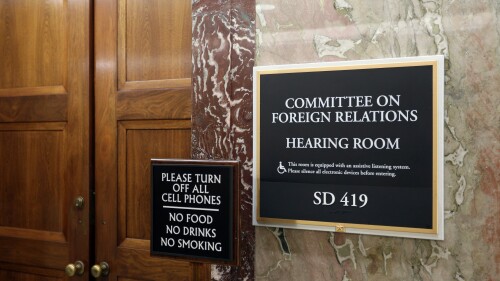Amer Ghalib, mayor of Hamtramck, MI, viciously mocked African Americans on his Facebook page, while his social media history appears to include an admission of voter fraud. |
The mayor of Hamtramck, Michigan, Amer Haiderah Ghalib, was recently exposed for mocking black political demonstrations and endorsing comments that referred to African Americans as “animal” and “inhuman.” He also accused Arab world leaders of being secret Jews and “liked” a Facebook post calling Jews “monkeys” who tax “the air we breathe.”
Ghalib, the first Muslim mayor in Hamtramck’s 100-year history, even admitted to committing a potential case of voter fraud by filling out absentee ballots for about 20 families during the 2020 presidential primary. Both the FBI and the Michigan secretary of state’s office have looked into the allegation.
Yet, in the era of “cancel culture,” when activist reporters have all but abandoned investigative reporting in favor of opinionated call-outs, not a column inch has been devoted to documenting the misdeeds of an internationally known public official. Black political activists have failed to march a single city block in opposition to Ghalib’s anti-black racism, and Jewish rights organizations are silent in the face of antisemitic dog whistles.
Ghalib’s ability to escape consequences for statements that would ruin another elected official — or for that matter, a private citizen — is indicative of a broader societal trend that privileges Islamists and lets them off the hook for bad behavior.
Recent history presents many examples. Islamists who slander Jews or call for their extermination are offered jobs on government anti-racism commissions. Muslim extremists whose social media accounts are littered with anti-black commentary have been invited to speak at Black Lives Matter rallies or selected to host discussions on Muslim-black solidarity.
Ghalib’s ability to escape consequences for statements that would ruin another elected official is indicative of a broader societal trend that privileges Islamists.
Ghalib is no exception. The 42-year-old Caribbean medical school student shared an offensive meme on Facebook that is frequently traded in white supremacist chat rooms and racist message boards. The image portrayed an African American overloaded with liquor bottles after presumably looting stores during the George Floyd protests.
Ghalib captioned the meme to suggest that the black man, whom he calls “Mr. Heineken,” considered looting alcohol a “duty” to acquire “essential nutrition.” He endorsed comments in the same thread describing African Americans as alcoholics who “will never behave unless they are governed by law, force, and the police who know them very well.”
Since Ghalib’s offensive statements were first published in an article at Focus on Western Islamism, a specialty news publication from the Middle East Forum (MEF), Detroit-area print and television media have been entirely uninterested in the story. In fact, MEF even tried prior to publication to hand over screenshots and professional translations of Ghalib’s posts to local and national media, granting exclusive rights to the story without any takers.
When it comes to anti-black racism, no town is too small and no politician is too insignificant for the media to splash career-ending headlines across their front pages. At least, this was the case recently for mayors in Clarke, New Jersey, and East Hampton, Massachusetts, who provoked frenzied news coverage of their racially insensitive comments.
In May, a city councilor from Everett, Massachusetts, was outed for sharing an anti-black meme and exchanging racist text messages with a city employee. Local high school students walked out of class in protest, and the pair resigned in shame.
Why, then, do Ghalib and other Islamists get a free pass?
There were high hopes for Hamtramck after its citizens elected the first all-Muslim city council in American history. The town motto: “The world in two square miles,” reflects Hamtramck’s diverse cultural landscape, where the remaining Polish families mix with more recently settled Bangladeshi and Yemeni immigrants.
To acknowledge the mayor’s bigotry is to recognize that some ideologies from the Middle East and South Asia are undesirable.
In this manner, Hamtramck is a proving ground for progressive multiculturalism. To acknowledge the mayor’s bigotry is to recognize that some ideologies from the Middle East and South Asia are undesirable, such as Arab discrimination of black Yemenis, who are treated as second-class citizens and confined to menial, low-paying jobs.
In addition, Ghalib fails to fit a carefully cultivated narrative peddled by Islamist “civil rights” groups and recognized as canon by the left: Muslims are the victims, never the perpetrators, of bigotry and xenophobia. They face daily harassment from government authorities, right-wing bigots, and Zionist Jews, according to Islamists that claim to document so-called “Islamophobia.”
Some celebrities and journalists even claim, “Muslim is the new black,” a tone-deaf and offensive refrain that demonstrates just how far identity politics inform views of the Muslim American experience. As a result, there is little interest in holding Ghalib accountable for his racist views.
This stark indifference extends beyond the media to government institutions and nonprofits expected to protect minorities from discrimination. Hamtramck’s all-Muslim city council has so far refused to discuss the matter publicly, even as Ghalib decries the “racist, Islamophobic, and xenophobic people” who dared to expose him.
Meanwhile, Hamtramck’s own chapter of the National Association for the Advancement of Colored People (NAACP) is keeping quiet as well. The chapter was not established by an African American, but by a Bangladeshi Muslim with a history of anti-gay bigotry.
Black activist groups in surrounding Detroit, including the NAACP and Black Lives Matter, have failed to respond to official complaints regarding the mayor’s racist comments.
Black activist groups in surrounding Detroit, including the NAACP and Black Lives Matter, have failed to respond to official complaints regarding the mayor’s racist comments, and the Anti-Defamation League, a Jewish watchdog group with offices in Michigan, has refused to comment.
Where does this leave Hamtramck’s African American community, a group that has endured discrimination from city leaders going back to the 1960s, when urban revitalization projects intentionally forced out dozens of black families? With just two black city council members in the past century, black Hamtramckans have lacked the representation necessary to assert themselves politically.
Furthermore, if the establishment media and civil rights organizations are unwilling to stand up to the mayor, who will hold him responsible for potentially committing multiple cases of voter fraud?
“I did my duty and voted early for [Senator Bernie] Sanders. There were twenty people around me planning to vote for [Joe] Biden because they loved Obama...” Ghalib wrote on March 8, 2020. “I got them to vote for Sanders and did their families’ ballot cards myself. Pray for the Jewish guy, don’t let him down,” he joked, apparently pointing out the irony that he would support a Jewish political candidate.
In Michigan, it is a felony to influence an absentee voter who is filling out their ballot. It is also illegal when completing another person’s absentee ballot to instruct them on how to vote.
Michigan Attorney General Dana Nessel recently prosecuted a grandmother for filling out her grandson’s absentee ballot. With so much attention directed at Michigan elections in recent years, Ghalib’s shocking admission should be enough to warrant at least a passing mention in Detroit newspapers.
Ultimately, activist and media indifference to Ghalib’s Facebook posts shows there is little pressure for Islamists to abandon radical and supremacist views.
Then again, perhaps this explains why reporters are unmoved. Pointing to Ghalib’s racist online statements requires also mentioning his alleged election abuses, and there is a concerted effort among establishment newsrooms to downplay and ignore allegations of voting irregularities — however insignificant — especially among immigrant communities and non-citizens.
Ultimately, activist and media indifference to Ghalib’s Facebook posts provides a pessimistic outlook on the future of social justice, racial equality, and election integrity in Detroit and Hamtramck. Equally troubling, it shows that there is little pressure for Islamists to abandon radical and supremacist views.
Benjamin Baird is the director of the Middle East Forum’s Islamism in Politics project.








